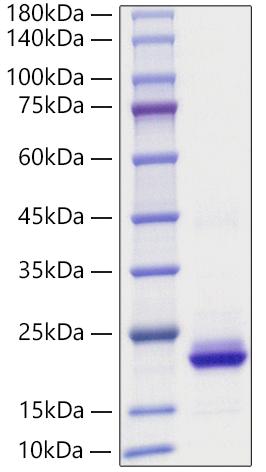Description
Recombinant Human CXCL2/MIP-2 Protein
The Recombinant Human CXCL2/MIP-2 Protein is a biologically active recombinant protein that plays a significant role in various cellular processes and signaling pathways in human biology. This protein is widely employed in immunological research, cell biology studies, protein-protein interaction analyses, and therapeutic development, providing researchers with a reliable tool for investigating CXCL2/MIP-2 function and its implications in health and disease.
This product (SKU: RPCB1232) is produced using E.coli. The protein exhibits a calculated molecular weight of 7.89 kDa with an observed molecular weight of 20-25 kDa under denaturing conditions, achieving ≥ 95 % as determined by SDS-PAGE., ensuring exceptional quality and consistency for research applications.
Key Features
| High Purity by Affinity Chromatography | |
| Mammalian & Bacterial Expression Systems | |
| High lot-to-lot consistency via strict QC |
| Product Name: | Recombinant Human CXCL2/MIP-2 Protein |
| SKU: | RPCB1232 |
| Size: | 10 μg , 20 μg , 50 μg , 100 μg |
| Reactivity: | Human |
| Synonyms: | CXCL2, GRO2, GROB, MIP2A, SCYB2, C-X-C motif chemokine 2, Growth-regulated protein beta, Gro-beta, Macrophage inflammatory protein 2-alpha, MIP2-alpha, Cleaved into: GRO-beta(5-73), GRO-beta-T, Hematopoietic synergistic factor, HSF, SB-251353 |
| Tag: | No-Tag |
| Expression Host: | E.coli |
| Calculated MW: | 7.89 kDa |
| Observed MW: | 20-25 kDa |
| Gene ID: | 2920 |
| Protein Description: | High quality, high purity and low endotoxin recombinant Recombinant Human CXCL2/MIP-2 Protein (RPCB1232), tested reactivity in E.coli and has been validated in SDS-PAGE.100% guaranteed. |
| Endotoxin: | < 1 EU/μg of the protein by LAL method. |
| Purity: | ≥ 95 % as determined by SDS-PAGE. |
| Formulation: | Lyophilized from a 0.22 μm filtered solution of 20mMTris,500mMNaCl,pH8.0 |
| Reconstitution: | Centrifuge the vial before opening. Reconstitute to a concentration of 0.1-0.5 mg/mL in sterile distilled water. Avoid vortex or vigorously pipetting the protein. For long term storage, it is recommended to add a carrier protein or stablizer (e.g. 0.1% BSA, 5% HSA, 10% FBS or 5% Trehalose), and aliquot the reconstituted protein solution to minimize free-thaw cycles. |
| Storage: | Store at -20℃.Store the lyophilized protein at -20℃ to -80 ℃ up to 1 year from the date of receipt. After reconstitution, the protein solution is stable at -20℃ for 3 months, at 2-8℃ for up to 1 week. |
CXCL2 is a chemokine induced by endotoxin and serves as an extremely potent chemo-attractant for neutrophils, acting as a crucial inflammatory mediator. CXCL2 could be produced by multiple, different cell types, including macrophages and cancer cells. CXCL2 is involved in cancer metastasis, angiogenesis, and wound healing. The amino acid sequence of human CXCL2 protein has low homology between mouse and rat CXCL2 protein. CXCL2 is 90% identical in amino acid sequence as a related chemokine, CXCL1. The gene for CXCL2 is located on human chromosome 4 in a cluster of other CXC chemokines. CXCL2 binds to the G-protein coupled receptor CXCR2 (IL-8RB) expressed on macrophages, neutrophils, and epithelial cells and its classical function is to act as chemotactic factors attracting neutrophils to sites of injury. In enterocytes, LPS induces CXCL2 expression and promotes migration of neutrophils in a model of platelet-activating factor induced shock and bowel injury. In acute lung injury, CXCR2 ligands, including CXCL1/2/3, have chemotactic effects for polymorphonuclear leukocytes. CXCL2 could provoke a dose-dependent increase of colorectal tumor cell migration in vitro. Further, according to Bachmeier et al., CXCL-1 and −2 silencing could down-regulate several metastasis-promoting genes and inhibit the metastatic potential of breast cancer cells.







